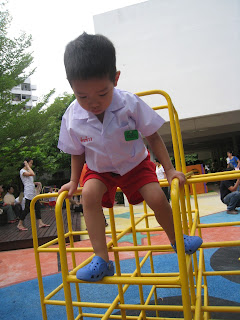Is Your Child Ready for Kindergarten?
Starting
kindergarten is a big step – and an exciting rite of passage – for young
children (and their parents). You love your child and want him to get off to a
good start in school. Maybe you have doubts about his development, or you
simply don’t know what will be required of him in the kindergarten classroom.
Below are some of the
key developmental milestones a child will ideally have reached by the time he
starts kindergarten. These requirements aren’t set in stone, however, and not every child will have mastered every skill by the
time he sets foot in the classroom.
Kindergarten
readiness involves four areas of development: Intellectual, physical,
social/emotional, and self-care.
Intellectual
Development
The
ABC’s of academic success in kindergarten require that your child:
·
Is interested in books and reading.
·
Holds a book upright and turns the pages.
·
Knows some songs and rhyming games.
·
Identifies some letters (especially those
in his name).
·
Identifies labels and signs at home and in
the neighborhood.
·
Pretends to read and write.
·
Knows his first and last name, names of
family members.
·
Can describe an experience and tell a
familiar story.
Physical Development
Kindergarteners
use their bodies as well as their brains! To thrive in kindergarten, your child
will need both small and large motor skills, such as:
·
Drawing with crayons, pens, and pencils,
with control.
·
Copying simple figures and shapes, such as
a straight line, circle, and square.
·
Running, jumping, and hopping.
·
Bouncing and catching a ball.
Social and Emotional
Development
School
and learning involve more than academics. A key to success in kindergarten (and
beyond) is being able to get along with others. In kindergarten, your child
should be able and willing to:
· Listen to an adult and follow simple
directions.
·
Cooperate and play well with other
children.
·
Sit still for short periods (15 minutes or
less).
Taking Care of
Personal Needs
Taking
care of one’s personal needs is not only practical, it’s also a sign of independence
and growth. And, for most young children, it’s a source of great pride! To
start kindergarten, your child should be able to:
·
Use the bathroom without assistance.
·
Wash his hands.
·
Eat without help, using utensils.
·
Dress himself and work snaps, buttons, and
zippers
·
Tie his shoes.
·
Recognize his own belongings (such as a
jacket or lunchbox).
Want more details? Check
out this kindergarten readiness checklist
How You Can Help Your
Preschooler Gear Up For Kindergarten
As
your child’s first teacher – and her loving parent – you’re in a perfect
position to prepare her for kindergarten. If she attends preschool, make sure
she’s in a program that provides a fun and stimulating learning environment.
Whether she’s in preschool or not, you can help her grow if you:
Read to your child daily. Visit
your public library for children’s story hour, and borrow books to enjoy
together at home. Snuggle up and read bedtime stories.
·
Build her vocabulary with
everyday conversation. Discuss your daily routines, interesting experiences,
and feelings. Listen to what she says, and correct her gently when necessary.
Avoid using “baby talk.”
·
Support her “social/emotional I.Q.” Classroom learning will require your child to listen and follow
directions and cooperate with others. She’ll also need to manage her emotions –
and be sensitive to the feelings of others. Be sure you provide clear guidance
in these skills, and let her practice them one-on-one (with a sibling or
friend) and in groups (both formal and informal).
·
Let your child play and create. Whether
it’s exploring outdoors, building a castle out of Lego’s, or finger painting,
play is a critical to developing your child’s imagination, creativity, critical
thinking skills, and problem-solving ability.
Let the Professionals
Weigh In
If
you have any questions or concerns about your child’s readiness to start
kindergarten, don’t think you have to go it alone. If your child attends
preschool, her teachers should be able to help you decide whether she needs
extra time or special help to prepare. And your child’s pediatrician can also
be a source of insight and information regarding your child’s development. Credit: KristinStanberry
Education.com




this is a exciting story for every one, normally me going to be a father ^^
ReplyDeleteKhon, you can use all my information from my blog to full fill a real parent.
ReplyDelete